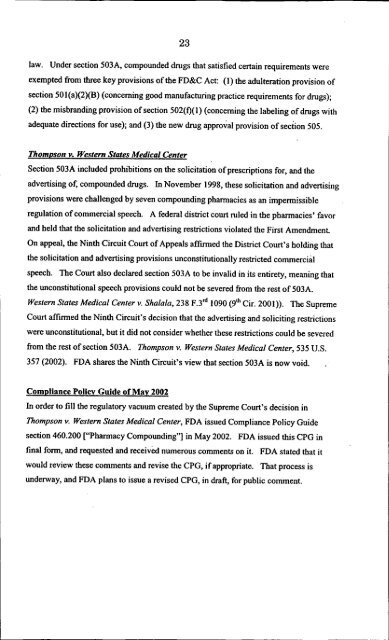Bioidentical Hormones - U.S. Senate Special Committee on Aging
Bioidentical Hormones - U.S. Senate Special Committee on Aging
Bioidentical Hormones - U.S. Senate Special Committee on Aging
Create successful ePaper yourself
Turn your PDF publications into a flip-book with our unique Google optimized e-Paper software.
23<br />
law. Under secti<strong>on</strong> 503A, compounded drugs that satisfied certain requirements were<br />
exempted from three key provisi<strong>on</strong>s of the FD&C Act: (1) the adulterati<strong>on</strong> provisi<strong>on</strong> of<br />
secti<strong>on</strong> 501(a)(2)(B) (c<strong>on</strong>cerning good manufacturing practice requirements for drugs);<br />
(2) the misbranding provisi<strong>on</strong> of secti<strong>on</strong> 502(f)( 1) (c<strong>on</strong>cerning the labeling of drugs with<br />
adequate directi<strong>on</strong>s for use); and (3) the new drug approval provisi<strong>on</strong> of secti<strong>on</strong> 505.<br />
Thomps<strong>on</strong> v. Western States Medical Center<br />
Secti<strong>on</strong> 503A included prohibiti<strong>on</strong>s <strong>on</strong> the solicitati<strong>on</strong> of prescripti<strong>on</strong>s for, and the<br />
advertising of, compounded drugs. In November 1998, these solicitati<strong>on</strong> and advertising<br />
provisi<strong>on</strong>s were challenged by seven compounding pharmacies as an impermissible<br />
regulati<strong>on</strong> of commercial speech. A federal district court ruled in the pharmacies' favor<br />
and held that the solicitati<strong>on</strong> and advertising restricti<strong>on</strong>s violated the First Amendment<br />
On appeal, the Ninth Circuit Court of Appeals affirmed the District Court's holding that<br />
the solicitati<strong>on</strong> and advertising provisi<strong>on</strong>s unc<strong>on</strong>stituti<strong>on</strong>ally restricted commercial<br />
speech. The Court also declared secti<strong>on</strong> 503A to be invalid in its entirety, meaning that<br />
the unc<strong>on</strong>stituti<strong>on</strong>al speech provisi<strong>on</strong>s could not be severed from the rest of 503A.<br />
Western States Medical Center v. Shalala, 238 F.3Td 1090 (9th Cir. 2001)). The Supreme<br />
Court affirmed the Ninth Circuit's decisi<strong>on</strong> that the advertising and soliciting restricti<strong>on</strong>s<br />
were unc<strong>on</strong>stituti<strong>on</strong>al, but it did not c<strong>on</strong>sider whether these restricti<strong>on</strong>s could be severed<br />
from the rest of secti<strong>on</strong> 503A. Thomps<strong>on</strong> v. Western States Medical Center, 535 U.S.<br />
357 (2002). FDA shares the Ninth Circuit's view that secti<strong>on</strong> 503A is now void.<br />
Compliance Policy Guide of May 2002<br />
In order to fill the regulatory vacuum created by the Supreme Court's decisi<strong>on</strong> in<br />
Thomps<strong>on</strong> v. Western States Medical Center, FDA issued Compliance Policy Guide<br />
secti<strong>on</strong> 460.200 ["Pharmacy Compounding"] in May 2002. FDA issued this CPG in<br />
final form, and requested and received numerous comments <strong>on</strong> it. FDA stated that it<br />
would review these comments and revise the CPG, if appropriate. That process is<br />
underway, and FDA plans to issue a revised CPG, in draft, for public comment.
















